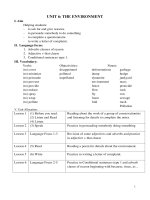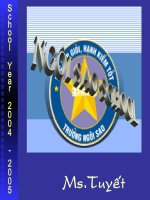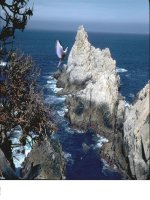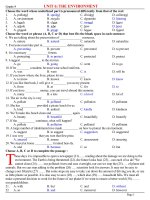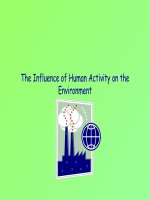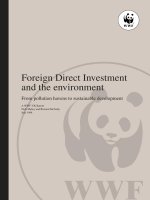TIENGANH10-UNIT9-PRESERVING THE ENVIRONMENT
Bạn đang xem bản rút gọn của tài liệu. Xem và tải ngay bản đầy đủ của tài liệu tại đây (165.68 KB, 11 trang )
<span class='text_page_counter'>(1)</span><div class='page_container' data-page=1>
<b>UNIT 9: PRESERVING THE ENVIRONMENT</b>
<b>LESSON 1: VOCABULARY + READING</b>
<b>* VOCABULARY REVIEW</b>
<b>Word</b> <b>Type</b> <b>Pronunciation</b> <b>Meaning</b>
aquatic <i>(adj)</i> /əˈkwætɪk/ dưới nước, sống ở trong nước
article <i>(n)</i> /ˈɑːtɪkl/ bài báo
chemical <i>(n)/ (adj)</i> /ˈkemɪkl/ hóa chất, hóa học
confuse <i>(v)</i> /kənˈfjuːz/ làm lẫn lộn, nhầm lẫn
+ confusion <i>(n)</i> /kənˈfjuːʒn/ sự lẫn lộn, nhầm lẫn
consumption <i>(n)</i> /kənˈsʌmpʃn/ sự tiêu thụ, tiêu dùng
contaminate <i>(v)</i> /kənˈtæmɪneɪt/ làm bẩn, nhiễm
damage <i>(v)</i> /ˈdæmɪdʒ/ làm hại, làm hỏng
deforestation <i>(n)</i> /ˌdiːˌfɒrɪˈsteɪʃn/ sự phá rừng, sự phát quang
degraded <i>(adj)</i> /dɪˈɡreɪd/ giảm sút chất lượng
deplete <i>(v)</i> /dɪˈpliːt/ làm suy yếu, cạn kiệt
+ depletion <i>(n)</i> /dɪˈpliːʃn/ sự suy yếu, cạn kiệt
destruction <i>(n)</i> /dɪˈstrʌkʃn/ sự phá hủy, tiêu diệt
ecosystem <i>(n)</i> /ˈiːkəʊsɪstəm/ hệ sinh thái
editor <i>(n)</i> /ˈedɪtə(r)/ biên tập viên
fertilizer <i>(n)</i> /ˈfɜːtəlaɪzə(r)/ phân bón
fossil fuel <i>(n.phr)</i> /ˈfɒs.əl ˌfjʊəl/ nhiên liệu hóa thạch (làm từ sự phân
hủy của động vật hay
thực vật tiền sử)
global
warming
<i>(n.phr)</i> /ˌɡləʊbl ˈwɔːmɪŋ/ sự nóng lên tồn cầu
greenhouse
effect
<i>(n.phr)</i> /ˈɡriːnhaʊsɪˈfekt/ hiệu ứng nhà kính
influence <i>(v,n)</i> /ˈɪnfluəns/ ảnh hưởng, tác dụng
inorganic <i>(adj)</i> /ˌɪnɔːˈɡỉnɪk/ vơ cơ
long-term <i>(adj)</i> /ˌlɒŋˈtɜːm/ dài hạn, lâu dài
mass-media <i>(n.phr)</i> /ˌmæs ˈmiːdiə/ truyền thông đại chúng
pesticide <i>(n)</i> /ˈpestɪsaɪd/ thuốc trừ sâu
polar ice
melting
/ˈpəʊlə(r) aɪs ˈmeltɪŋ/ sự tan băng ở địa cực
pollute <i>(v)</i> /pəˈluːt/ gây ô nhiễm
+ pollutant <i>(n)</i> /pəˈluːtənt/ chất ô nhiễm
+ pollution <i>(n)</i> /pəˈluːʃn/ sự ơ nhiễm
preserve <i>(y)</i> /prɪˈzɜːv/ giữ gìn, bảo tồn
+ preservation <i>(n)</i> /ˌprezəˈveɪʃn/ sự bảo tồn, duy trì
protect <i>(v)</i> /prəˈtekt/ bảo vệ, che chở
+ protection <i>(n)</i> /prəˈtekʃn/ sự bảo vệ, che chở
sewage <i>(n)</i> /ˈsuːɪdʒ/ nước cống
</div>
<span class='text_page_counter'>(2)</span><div class='page_container' data-page=2>
<b>* EXERCISES</b>
<b>I. WORD FORMS: Supply the correct word form.</b>
1. People should change their habit of using plastic bags to contribute to environmental __________.
<b>(preserve)</b>
2. One of the causes of massive _________________ is a lack of awareness of a few local people. (forest)
3. A ___________ energy system converts the energy found in sunlight, wind, falling water, waves,
geothermal heat, or biomass. (renew)
4. The energy ___________ of the community has increased since the new resort was built. (consume)
5. The coastal areas have been severely ______________ by the disposals of harmful chemical rubbish.
<b>(pollute)</b>
6. Could you _________ the picture over the sofa? (straight)
7. I found the visit most _________. (education)
8. The police are interested in the sudden _________ of the valuable paintings. (appear)
<b>II. GAP-FILL: Complete the sentences, using the given words/ phrases in the box: </b>
<i><b>flood ice caps environment gradual rise</b></i>
<i><b>protect rural industrial</b></i> <i><b> extinct </b></i>
1. There are lots of things we can all do to ___________ the environment.
2. If you ask me, ____________ waste is a much bigger problem than ordinary household waste.
3. There’s been a ___________ in Germany and a village was completely destroyed.
4. Dinosaurs have been __________ for millions of years.
5. As towns grow, they tend to destroy the surrounding ___________ areas.
6. During the last hundred years we have done great damage to the ______________.
7. The ____________ in the Earth's temperature is known as global warming.
8. As the Earth gets hotter, the Arctic and Antarctic ____________ will slowly melt and the level of the
oceans will rise.
<b>III. MUTIPLE CHOICE QUESTIONS. </b><i><b>Choose the best option.</b></i>
1. Environmental pollution is becoming an _____ serious problem that needs to be taken care of as soon as
possible.
A. increasingly B. increasing C. increase D. increased
2. Do you know what CFC _____?
A. sets in B. does up C. stands for D. gets down
3. The gradual rise in the Earth’s temperature is known as _____.
A. greenhouse effect B. global warming C. ozone layer D. acid rain
4. During the last hundred years we have done great _____ to the environment.
A. injury B. pollution C. damage D. hurt
5. In my opinion, _____ waste is a much bigger problem than ordinary household waste.
A. industrial B. business C. working D. manufacturing
6. Many of the world’s largest cities are _____ and some are permanently covered by a _____.
A. heavily polluted – polluted cloud B. heavy pollution – polluted cloud
C. heavy pollution – cloud of pollution D. heavily polluted – cloud of pollution
<i><b>Choose the word(s) CLOSEST in meaning to the underlined word(s) in each of the following questions.</b></i>
7. Water pollution is a result of dumping pollutants such as detergents, pesticides, oil, and other chemicals
in rivers, which makes the water unclean.
A. substances B. stuffs C. contaminants D. wastes
8. The natural environment has been seriously influenced and degraded by human activities through many
decades.
A. worsened B. damaged C. destroyed D. reduced
<i><b>Choose the word(s) OPPOSITE in meaning to the underlined word(s) in each of the following questions.</b></i>
9. Soil pollution leads to lack of fertile land to grow enough food for an increasing population.
</div>
<span class='text_page_counter'>(3)</span><div class='page_container' data-page=3>
10. Global warming may lead to many negative changes, including harsher weather conditions.
A. more unbearable B. milder C. more extreme D. more serious
<b>IV. READING: A. Choose the word or phrase to fill in the blanks in the following passage:</b>
Nowadays, people are more aware that wildlife all over the world is in (1)_______. Many species of
animals are threatened, and could easily become (2)_______ if we do not make an effort to protect them.
There are many reasons for this. In some cases, animals are (3)_______ for their fur or for other valuable
parts of their bodies. Some birds, (4)_______ as parrots, are caught alive and sold as pets. For many animals
and birds, the problem is that their habitat - the place where they live - is (5)_______. More and more land is
used for farms, for houses and for industry. All the Earth is being polluted seriously. If we do not control our
action, there will be only one successful animals on the Earth - human beings.
1. A. problem B. vanishing C. threat D. danger
2. A. appeared B. empty C. bloomed D. extinct
3. A. game B. chased C. hunted D. extinct
4. A. like B. such C. or D. where
5. A. disappearing B. disappears C. being disappeared D. disappeared
<b>B. Read a text and answer the questions that follow. </b>
<b>THE BALANCE OF NATURE</b>
All the different plants and animals in a natural community are in a state of balance. This balance is
achieved by the plants and animals interacting with each other and with their non-living surroundings.
The plants of a community are the producers: they use carbon dioxide, oxygen, nitrogen to build up
their tissues using energy in the form of sunlight. The plant tissues form food for the plant-eating animals
(herbivores) which are in turn eaten by flesh-eating animals (carnivores). Thus, plants produce the basic
food supply for all the animals of a community. The animals themselves are the consumers, and are either
herbivores or carnivores.
Examples of herbivores in a woodland community are rabbits, deer, mice and snails, and insects such
as aphids and caterpillars. The herbivores are sometimes eaten by the carnivores. Woodland carnivores are
of all sizes, from insects such as beetles and lacewings to animals such as owls, shrews and foxes. Some
carnivores feed on herbivores, some feed on the smaller carnivores, while some feed on both: a tawny owl
will eat beetles and shrews as well as voles and mice. These food relationships between the different
members of the community are known as food chains or food webs. All food chains start with plants. The
links of the chain are formed by the herbivores that eat the plants and the carnivores that feed on the
herbivores. There are more organisms at the base of the food chain than at the top; for example, there are
many more green plants than carnivores in a community.
Another important section of the community is made up of the decomposers. They include the
bacteria and fungi that live in the soil and feed on dead animals and plants. By doing this they break down
the tissues of the dead organisms and release mineral salts into the soil.
1. Which of the following statements is TRUE?
A. All the plants in a wood are eaten by animals.
B. All the animals in a wood depend on plants for their food supply.
C. Plants and animals in a natural community do not interact with their non-living surroundings.
D. The balance of a natural community means there is no primary species.
2. All of the following statements are true, EXCEPT ____.
A. some animals eat other animals B. plants depend on the sun to grow
C. plants depend on the gasses in the atmosphere to grow D. not every food chain starts with plants
3. Which of the following is NOT an example of carnivores?
A. shrew B. lacewings C. owl D. aphids
4. What makes the links in a food chain?
A. the plants and the herbivores B. the herbivores and the carnivores
C. the carnivores and the decomposers D. the plants and the decomposers
5. The word “organism" in paragraph 3 is closest in meaning to ____.
</div>
<span class='text_page_counter'>(4)</span><div class='page_container' data-page=4>
<b>UNIT 9: PRESERVING THE ENVIRONMENT</b>
<b>LESSON 2: LEXICO - GRAMMAR</b>
<b>* GRAMMAR REVIEW</b>
<b>I. REPORTED SPEECH</b>
<b>1. Statement: Câu tường thuật</b>
</div>
<span class='text_page_counter'>(5)</span><div class='page_container' data-page=5>
<b>Ex: “I will come back tomorrow” Mary said.</b>
Mary said that she would come back the next day.
<b>Note: said => said that said to sb => told sb that</b>
<b>2. Command: Câu yêu cầu, đề nghị</b>
<b>Ex: “Don't talk in class” The teacher said to us. The teacher told us not to talk in class.</b>
<b>3. Yes / No Questions</b>
<b>Form: S + asked + (sb) + if / whether + Mệnh đề lùi thì</b>
Ex: "Can you speak English, Diep?" I asked. I asked Diep if she could speak English.
<b>4. Wh-Question</b>
<b>Ex: “Where are you from?” He asked me He asked me where I were from.</b>
<b>5. Khơng lùi thì</b>
<b>Ex: “I'm very exhausted now” she says. She says she is very exhausted now.</b>
<b>* BẢNG LÙI THÌ</b>
<b>DIRECT SPEECH</b> <b>REPORTED SPEECH</b>
Simple present Simple past
Present continuous Past continuous
Present perfect Past perfect
Simple past Past perfect
Past continuous Past perfect continuous
Future (will/shall) Future in the past (would/ should)
Near future (be going to V) Was/were going to V
Can Could
May Might
Must Had to
Needn’t Didn’t have to
<b>* BẢNG LÙI TRẠNG NGỮ</b>
<b>DIRECT SPEECH</b> <b>REPORTED SPEECH</b>
this that
these those
here there
now then
ago before (earlier)
today that day
tonight that night
tomorrow the next day
the following day
the day after
<b>Form: </b>S+ asked / told + sb + (not) + to V
<b>Form: </b>S + asked + (sb) + Wh + Mệnh đề lùi thì
</div>
<span class='text_page_counter'>(6)</span><div class='page_container' data-page=6>
yesterday the previous day
the day before
next + N the following + N
the N + after
last + N the previous + N
the N + before
<b>* EXERCISES</b>
<b>I. Choose the word whose underlined part is pronounced differently from that of the rest in the</b>
<b>following questions.</b>
1. A. depletion B. preservation C. ecosystem D. completion
2. A. erosion B. confusion C. mission D. television
3. A. damage B. sewage C. advantage D. engage
4. A. aquatic B. access C. altar D. ancestor
<b>II. Choose the word that differs from the other three in the position of primary stress in the following</b>
<b>questions.</b>
5. A. article B. newsletter C. editor D. pollution
6. A. disposal B. animal C. energy D. poverty
7. A. awareness B. solution C. importance D. happiness
8. A. influence B. protection C. chemical D. scientist
<b>III. Verb tenses: </b>
1. We _____him that he was the first customer to our newly-open shop. (tell)
2. “We’re watching TV,” said the twins. <sub></sub> The twins said they _____ TV. (watch)
3. Jason told me that he _______ his best in the exam the next day. (do)
4. "I'm a big fan of U23.” Derek said. <sub></sub> Derek said he ____ a big fan of U23. (be)
5. “You've been annoying me all day!" my mum said. <sub></sub> My mum said I ____ her all day. (annoy)
6. "The dog ate my homework!” said Ivan. <sub></sub> Ivan said the dog ________ his homework. (eat)
7. "At one o'clock, I was having lunch," said Molly. <sub></sub> Molly said she _____ lunch at one o'clock. (have)
8. "You'll get wet without an umbrella," Dad said. <sub></sub> Dad said I ____ wet without an umbrella. (get)
<b>IV. WRITING: Change the direct speech statements into reported speech. Make any changes, if</b>
<b>necessary.</b>
1. She said: “I don’t want anything to eat now.”
……….………..
2. “I’ve only had this new bicycle since yesterday,” Peter said.
……….………..
3. “Are you a student?” the woman asked the boy.
……….………..
4. The captain said to them: “Wait here until I come back”.
……….………..
5. “I’ll finish it by the end of this week,” he said.
He promised………….………..
6. “You shouldn’t use your cars for short distances,” the teacher said.
The teacher advised her students ………..
<b>V. MULTIPLE CHOICE QUESTIONS: </b><i><b>Choose the best option.</b></i>
1. "He can juggle five balls!" said Angie. Angie said he ____ five balls.
</div>
<span class='text_page_counter'>(7)</span><div class='page_container' data-page=7>
A. pass B. if he passes C. to pass D. if he would pass
4. "Would you mind waiting for a moment?" the shop assistant asked the woman.
The shop assistant asked the woman ____ for a moment.
A. to wait B. waiting C. if she waits D. if she minds waiting
5. “Please don't leave your dirty football boots in the hall," Mum said to Doug.
Mum told Doug ____ dirty football boots in the hall.
A. that he doesn't leave his B. not to leave his C. not to leave your D. don't leave his
6. "Could you tell us where you were at six o'clock?" the police officer asked Barry.
The police officer asked Barry ____ had been at six o'clock.
A. telling him where you B. where he tells him he
C. to tell him where you D. to tell him where he
7. "Could I have your e-mail address?" I asked Mariella. I asked Mariella ____ e -mail address.
A. to give me her B. give me your C. give me her D. gave me your
8. "Can I have a new Xbox for my birthday?" I asked my mum. I asked my mum ____ a new Xbox
for my birthday.
A. that she gets me B. get me C. to get me D. if she could have me
9. "What's your name?" she asked me. She asked me ____.
A. what your name is B. what your name was C. what my name is D. what my name was
10. "Are you a student?" the man asked the boy. The man wanted to know ____.
A. if I was a student B. if the boy was a student C. if I am a student D. if the boy is a student
11. "What school are you going to?" he asked me. He wanted to know ____.
A. what school am I going to B. what school you are going to
C. what was the school I go to D. what school I was going to
12. "I won't be home this evening because I have to work late," Mike said. Mike said that ____.
A. I wouldn't be home this evening because I had to work late
B. he wouldn't be home this evening because he had to work late
C. he won't be home this evening because he has to work late
D. he wouldn't be home that evening because he had to work late
<i><b>Choose the underlined part that needs correction in each of the following questions:</b></i>
13. Tim called yesterday and said he needed the report right now.
A. called B. said C. needed D. now
14. Rosy said that she will come back there on another project the following year.
A. said B. will come back C. there D. the following
15. The teacher asked his students to focus on your topic.
A. asked B. his students C. to focus D. your
16. Mr Jones told his children not to wasting fresh water.
</div>
<span class='text_page_counter'>(8)</span><div class='page_container' data-page=8>
<b>UNIT 9: PRESERVING THE ENVIRONMENT</b>
<b>LESSON 3: PRACTICE TEST </b>
<i><b>Choose the word whose underlined part is pronounced differently from that of the rest in the following</b></i>
<i><b>questions.</b></i>
1. A. bear B. year C. ear D. dear
2. A. environment B. wildlife C. circulation D. hydroelectric
<i><b>Choose the word that differs from the other three in the position of primary stress in the following</b></i>
<i><b>questions</b></i><b>.</b>
3. A. beautiful B. consumption C. offensive D. aquatic
4. A. animal B. destruction C. unfriendly D. solution
<i><b>Choose the best option for each of the following sentences</b></i>
5. There is a ... of water because it hasn’t rained for a long time.
A. shortage B. short C. shortest D. shorter
6. The river has been polluted with toxic waste from ... factories.
A. locally B. locate C. local D. locality
</div>
<span class='text_page_counter'>(9)</span><div class='page_container' data-page=9>
A. extinction B. survival C. elimination D. disappearance
8. The heavily polluted water near the factory ... the safety of the local people.
A. preserves B. contaminates C. is threatened D. endangers
9. The huge oil slick is moving slowly towards Ireland, and several miles of coastline are under ...
A. threat B. stake C. pressure D. damage
10. It is predicted that over the next few decades many species will die __ as once fertile areas turn to desert.
A. off B. out C. up D. down
11. Most of the air pollution results _______ the burning of fossil fuels, motor vehicles, factories, aircraft
and rockets.
A. in B. to C. on D. from
12. Stop the degradation of the planet’s natural environment and build a future in which humans live in
____________ nature.
A. agree with B. fall in love with C. harmony with D. cooperate with
13. There are more and more species that are ...
A. in danger of extinct B. in danger of extinction C. in danger of death D. in danger of dead
14. “Why don’t we have a look at some websites for more information about the environment?” – “_____.”
A. Yes, thanks. B. Yes, why not? C. It’s my pleasure. D. Do we?
15. “_____” - “That’s a good idea.”
A. What about recycling water for gardening? B. Sorry, can I say something?
C. Glad to work with you. D. Excuse me, I want to add something.
16. Tom and Henry asked me to go with ______.
A. him B. their C. them D. they
17. “Anna left here an hour ago," she said. She told me that ____.<sub></sub>
A. Anna had left here an hour ago B. Anna had left there an hour ago
C. Anna had left here an hour before D. Anna had left there an hour before
18. Bob wanted to know when ____.
A. will the exam be taken B. the exam will be taken
C. would the exam be taken D. the exam would be taken
19. ... the foreigner where he came from.
A. They asked B. They said C. They informed D. They stated
20. “I’ve bought a ring,” he said to his girlfriend.
A. He said his girlfriend that he had bought a ring. B. He said his girlfriend that he bought a ring.
C. He told his girlfriend that he had bought a ring. D. He told his girlfriend that he bought a ring.
21. “Let’s go for a walk. We’ve been working all day,” said Joanna.
A. Joanna suggested going for a walk because they had been working all day.
B. Joanna insisted on going for a walk because they had been working all day.
C. Joanna suggested going for a walk because they have been working all day.
D. Joanna suggested going for a walk because she had been working all day.
22. “Where did you work 2 years ago?” asked her boss.
A. Her boss wanted to know where did she work 2 years ago.
B. Her boss wanted to know where had she worked 2 years before.
C. Her boss wanted to know where she has worked 2 years before.
D. Her boss wanted to know where she had worked 2 years before.
23. “We saw a strange man in the garden," they told their son.
A. They told their son that we had seen a strange man in the garden.
B. They told their son that they had seen a strange man in the garden.
C. They told their son that we saw a strange man in the garden.
D. They told their son that they saw a strange man in the garden.
<i><b>Choose the underlined part that needs correction in each of the following questions.</b></i>
24. Sally called from Miami and said that she was swimming here.
A B C D
25. They complained that there isn't any fresh water in the local area.
A B C D
26. Clarence said he couldn't have repaired the car the next day.
</div>
<span class='text_page_counter'>(10)</span><div class='page_container' data-page=10>
<i><b>Choose the word(s) CLOSEST in meaning to the underlined word(s) in each of the following questions.</b></i>
27. We are facing severe environmental pollution despite the fact that many world organizations are
working hard to reduce it.
A. heavy B. destructive C. harmful D. serious
28. The seashore was much polluted because of the amount of waste left there. All this rubbish is killing fish
and other marine life.
A. sea plants B. sea mammals C. water life D. sea creatures
<i><b>Choose the word(s) OPPOSITE in meaning to the underlined word(s) in each of the following questions.</b></i>
29. One way to protect our environment from pollution is to reduce wasteful consumption.
A. costly B. excessive C. safe D. economical
30. Fresh water is very important to life because no one can live without it. Yet it is one of the limited and
most endangered natural resources on our planet.
A. Clean B. Drinkable C. Polluted D. Running
<i><b>Read the passage and fill in the numbered blanks to complete it. </b></i>
Earth is the only place we know of in the universe that can support human life. (31) _____, human
activities are making the planet less fit to live on. As the Western world carries on consuming two-thirds of
the world's resources while half of the world's population do, so just to stay alive we are rapidly destroying
the only resource we have. Everywhere fertile soil is either built on or washed (32) _____ the sea.
Renewable resources are exploited so much that they will never be able to recover (33) _____. We discharge
pollutants into the atmosphere without any thought of the consequences. As a (34) _____, the planet's ability
to support people is being reduced at the very time when rising human numbers and consumption are
making increasingly heavy demands on it.
The Earth's natural resources are there for us to use. We need food, water, air, energy, medicines,
warmth, shelter and minerals to keep us fed, comfortable, healthy and active. If we are sensible in how we
use the resources, they will (35) _____ indefinitely. But if we use them wastefully and excessively, they will
soon run out and everyone will suffer.
31. A. Although B. Still C. However D. Eventually
32. A. into B. from C. at D. for
33. A. complete B. completely C. completion D. incompleted
34. A. development B. result C. reaction D. product
35. A. last B. stand C. go D. remain
<i><b>Read the passage below and choose the best answer (A, B, C or .D) to each question.</b> </i>
In many ways, the increasingly rapid pace of climate change is a direct result of the growth of the
human population. In the last 100 years, the world population has more than tripled. Obviously, this has
meant that the world has needed to produce three times as much food, energy, and other natural resources.
In addition, the average person uses more energy and natural resources than the average person one
hundred years ago, meaning that the rates of consumption are actually much higher than just the increase in
population would imply.
All of these activities: food production, energy usage, and the use of natural resources, contribute to
climate change in some way. The greater amounts of oil and other fuels burned to create energy release
chemicals which add to global warming. In order to produce more food, farmers cut down trees to gain more
land for their fields. In addition, we cut down trees to build the houses needed for a larger population. Those
trees are an essential part of controlling global warming.
</div>
<span class='text_page_counter'>(11)</span><div class='page_container' data-page=11>
<i>36. The word “<b>pace</b>” in the passage is closest in meaning to _____.</i>
A. growth B. speed C. problem D. pollution
<i>37. Which word in the passage is closest in meaning to “three times”?</i>
A. double B. 100 years C. 1.3 billion D. tripled
<i>38. According to the passage, how does food production contribute to global warming?</i>
A. Food production requires that the forests be cleared to create farmland.
B. Food production uses many chemicals which add to global warming.
C. Producing more food leads to growth in the world population.
D. Food production decreases the ability of the air to release heat.
<i>39. According to the passage, how does the standard of living affect global warming?</i>
A. Higher standards of living are better for the environment.
B. First world nations create less population than developing nations.
C. The use of natural resources is directly related to the standard of living.
D. High standards of living lead to increases in world population.
<i>40. Why does the author discuss China, Japan and the United States?</i>
A. To compare the standards of their citizens.
</div>
<!--links-->

